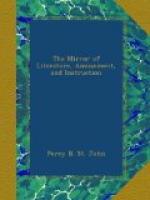And within that rich pavilion
High on a glittering throne,
A woman’s form sat silently,
Midst the glare of light alone.
Her Jewell’d robes fell strangely
still—
The drapery on her breast
Seem’d with no pulse beneath to
thrill,
So stone-like was its rest.
But a peal of lordly music
Shook e’en the dust
below,
When the burning gold of the diadem
Was set on her pallid brow!
Then died away that haughty sound,
And from th’ encircling
band,
Stept Prince and Chief, ’midst the
hush profound,
With homage to her hand.
Why pass’d a faint cold shuddering
Over each martial frame,
As one by one, to touch that hand,
Noble and leader came?
Was not the settled aspect fair?
Did not a queenly grace,
Under the parted ebon hair.
Sit on the pale still face?
Death, Death! canst thou be lovely
Unto the eye of Life?
Is not each pulse of the quick high breast
With thy cold mien at strife?
—It was a strange and fearful
sight,
The crown upon that head,
The glorious robes and the blaze of light,
All gather’d round the
Dead!
And beside her stood in silence
One with a brow as pale,
And white lips rigidly compress’d,
Lest the strong heart should
fail;
King Pedro with a jealous eye
Watching the homage done
By the land’s flower and chivalry
To her, his martyr’d
one.
But on the face he look’d not
Which once his star had been:
To every form his glance was turn’d,
Save of the breathless queen;
Though something, won from the grare’s
embrace,
Of her beauty still was there,
Its hues were all of that shadowy place,
’Twas not for him
to bear.
Alas! the crown, the sceptre,
The treasures of the earth,
And the priceless love that pour’d
those gifts,
Alike of wasted worth!
The rites are closed—bear back
the Dead
Unto the chamber deep,
Lay down again the royal head,
Dust with the dust to sleep.
There is music on the midnight—
A requiem sad and slow.
As the mourners through the sounding aisle
In dark procession go,
And the ring of state, and the starry
crown,
And all the rich array,
Are borne to the house of silence down,
With her, that queen of clay.
And tearlessly and firmly,
King Pedro led the train—
But his face was wrapt in his folding robe,
When they lower’d the dust again.
—’Tis hush’d at last, the
tomb above,
Hymns die, and steps depart:
Who call’d thee strong as Death, O Love?
Mightier thou wert and art!
New Monthly Magazine.
[7] Don Pedro of Portugal, after
his accession to the kingdom,
had the body of the murdered Inez taken from the
grave, solemnly
enthroned and crowned.




